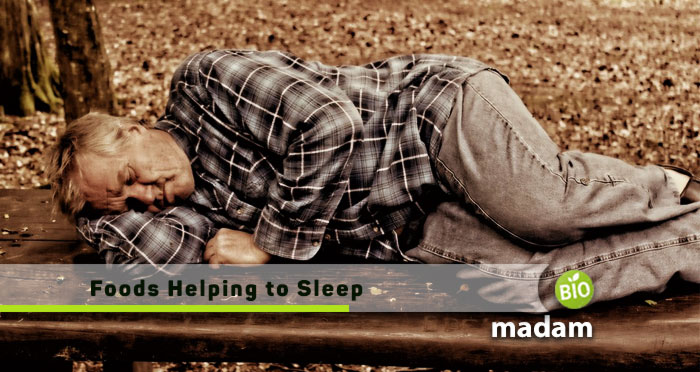Recently updated on March 21st, 2023 at 11:28 am
The National Sleep Foundation Guidelines recommend sleeping between 7 to 9 hours per night for a healthy body and mind. While many people are able to sleep through the night peacefully, and are the regular morning persons, some complain that they cannot sleep.
Sometimes it could be due to a job routine, young children, or depression. Such people cannot put the finger on any particular cause of sleeplessness. Experts typically advise avoiding caffeine intake a few hours before bed in such situations.
Besides the inability to sleep on time some days, reports also suggest that over 35% of Americans have insomnia. So, introducing sleep-inducing foods to the diet can help with insomnia and restlessness.
Here are all the foods and constituents that help you sleep soundly throughout the night.
Milk
Taking milk at night before sleeping is common in many cultures. While it may only seem an orthodox practice, it comes with numerous benefits.
Taking warm milk at night can help induce sleep and combat insomnia. In the past, people drank milk before sleep because they believed you sleep well on a full stomach. Recent studies suggest that milk provides you with micronutrients like tryptophan and melatonin that induce sleep. It also contains proteins, vitamin D, minerals, and calcium.
You can substitute full-fat milk with low-fat milk to get all the goodness without the extra carbs and calories.
Chamomile Tea
Talking of warm, sleep-promoting goodness, chamomile tea is a must on the list. Chamomile tea has been known for its benefits like reducing inflammation, managing diabetes and blood pressure, and reducing menstrual pain.
But did you know it is an excellent beverage to eliminate insomnia?
Apigenin in the tea is immensely helpful in a night of good sleep. Apigenin is an antioxidant that binds to sleep-promoting GABA receptors.
In 2011, researchers deduced that chamomile, tea twice daily, makes you sleep 15 minutes faster. It also lessens the frequency of nighttime wakening compared to the control group. It is also known to improve sleep quality.
Celery
If you did not expect to see celery on the list of best foods to help you sleep, you are in for a surprise!
Celery has several health benefits, containing nutrients like calcium, potassium, vitamins, phthalates, antioxidants, etc. They help with blood pressure, Alzheimer’s, and cancer prevention. One of the most vital celery benefits is its role in inducing sleep. Phthalates in celery help stabilize the nervous system, which improves sleep quality. You can take celery boiled, baked, or a glass of celery juice works just fine! However, taking excessive celery in your diet can result in many side effects.
Nuts
Nuts are an excellent energy source and are recommended by nutritionists for healthy body functioning. They contain 40% – 80% fats and almost no carbs. You can eat a handful of nuts every day without worrying about any adverse effects. This handful of nuts not only improves health but also improves slumber.
Almonds are not true nuts, but they contain melatonin that regulates your circadian rhythm to prepare your body to sleep on time. They also provide magnesium that enhances sleep quality in people with insomnia.
Besides almonds, walnuts are the most popular nuts for brain health and provide 19 vitamins and minerals. Like almonds, walnuts are also rich in melatonin and help the sleep cycle.
Dark Chocolate
Dark chocolate is a blessing for chocolate lovers as it helps with many health conditions, including insomnia. They are loaded with nutrition, help reduce heart disease risk, antioxidant boost, and raise HDL in the body.

Besides all these benefits, dark chocolate is also good for brain health and is one of the best foods to help you sleep soundly. You can take a chunk of dark chocolate before sleep and see the magic!
Serotonin in dark chocolate relaxes your mind and body, enabling you to sleep peacefully throughout the night.
Kiwi
Kiwis are popular for being nutritious, low-calorie fruit. One piece contains only 42 calories and provides you with plentiful potassium, folate, and trace minerals. Kiwi is rich in antioxidants and is considered the best food to eat before sleeping.
Studies show that people taking kiwi an hour before sleeping fell asleep 42% earlier than their previous bedtime. It also increases the total sleep duration by 13%. The sleep-inducing properties are attributed to the presence of melatonin, the same compound found in nuts.
White Rice
Many people often complain that they feel sleepy after a hearty rice meal. Do you know why that is so?
White rice has a high amount of carbohydrates and protein, thus a high Glycemic Index (GI). Foods with a high GI help with sleep quality and offer a longer sleep duration.
Nutritionists do not recommend eating rice every day at night due to the high amount of carbohydrates. However, you can add them to your diet and take an adequate amount of white rice to induce sleep naturally.
Lettuce
Lettuce is often used to promote sleep in insomnia as lettuce and lettuce seed oil have a mild sedative effect. It contains n-butanol that gives a sedative-hypnotic effect, and improves sleep.
A 2017 research mentioned that lettuce also protects cells against inflammation and stress damage from sleep disturbances.
Munch on lettuce as a snack, or enjoy a hearty salad for dinner for better sleep.

The Bottom Line
A peaceful slumber is inevitable for good mental and physical health. Reports show that 35% of Americans are insomniacs and look for remedies to improve sleep. Taking nuts and dark chocolate adequately has proved to help induce sleep. Kiwis, warm milk, chamomile tea, lettuce, white rice, and celery are also among the best foods to help you sleep. Choose your favorite from these and enjoy nights of better sleep.
FAQs
What should I eat if I have insomnia?
Almonds, chamomile tea, turkey, kiwi, fatty fish, celery, walnuts, and lettuce have been proven to help people with insomnia.
Which chemical in food makes you sleepy?
Foods containing L-tryptophan help induce sleep. The brain converts L-tryptophan into Serotonin that binds to chemical receptors to promote sleep.
Does peanut butter help you sleep?
Peanut butter is not among the best foods to help you sleep. But, it also contains some amount of tryptophan which can be beneficial in regulating the sleep cycle.

Meet me; I am Paulina Zaniewska, who’s more hooked on providing the best health blog. I’ve always been so determined to compete as a nutritionist, and here I am, done with a Master’s in food technology. My brilliant performance throughout encouraged me to help people.

